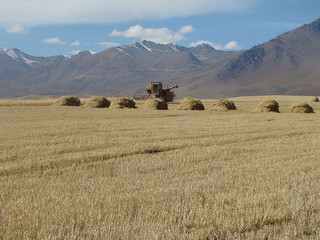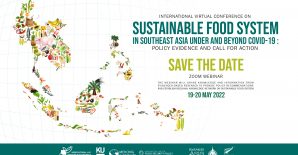This press release is cross-posted from IFPRI
April 7, 2014, Bishkek, Kyrgyzstan— A conference organized by the International Food Policy Research Institute (IFPRI) and the University of Central Asia (UCA>) to be held from April 8-9 will explore how Central Asian countries can best meet the needs of present and future populations for adequate access to nutritious and safe foods and improve food and nutrition security.
During the two-day event, government officials, development partners, and researchers from the region and abroad will share perspectives on agricultural and structural transformation, value chains, food safety and nutrition, agricultural markets and trade, modern input use and constraints on agricultural productivity improvements, climate change, remittances, and other emerging issues in agriculture and food security in Kyrgyzstan, Tajikistan, Uzbekistan, Kazakhstan, and the region as a whole.
“An adequate diet of safe and nutritious food is a necessity—both for individuals to fulfill their human potential and for nations to meet targets for growth and prosperity,” said Karen Brooks, Director of CGIAR Research Program on Policies, Institutions, and Markets (PIM). “How to feed a growing population now and in the future remains a challenge, but it is one that can be met. This conference opens a joint effort to explore how evidence can be applied to decisions on food security in the specific context of Central Asia.”
The conference will also unveil IFPRI’s new Central Asia Research and Capacity Strengthening Program, implemented in partnership with the Eurasian Center for Food Security at Moscow State University, the University of Central Asia, and other research institutions in the region, in collaboration with PIM and the CGIAR Research Program on Agriculture for Nutrition and Health. The new program will contribute to ensuring food and nutrition security, improving livelihoods, and conserving natural resources through sustainable agricultural development in Central Asia.
“The University of Central Asia is pleased to partner with IFPRI and co-host this conference,” said UCA Director General Bohdan Krawchenko. “Our research institutes are working to generate both information and skills that can be directly applied to addressing critical issues facing the region, and there can be no more urgent issue than food security within the context of the region’s other vulnerabilities.”
For his part, Kamiljon Akramov, the program leader and research fellow at IFPRI, commented: “We hope the conference will shed some light on how to boost the agricultural sector and improve food and nutrition security in Central Asia, and inform future research and capacity building activities for IFPRI and its partners.”
In the last decade, Central Asia has experienced significant agricultural and economic growth as well as improvements in household welfare. However, food and nutrition insecurity persists among the most vulnerable. Stunting (low height for age) rates for children under five—a common indicator of malnutrition—remain relatively high in Central Asia, ranging from 13 percent in Kazakhstan to 39 percent in Tajikistan, according to the most recent data from UNICEF and the World Bank.




Leave a Reply